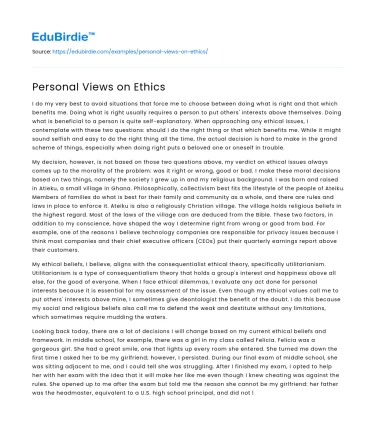I do my very best to avoid situations that force me to choose between doing what is right and that which benefits me. Doing what is right usually requires a person to put others' interests above themselves. Doing what is beneficial to a person is quite self-explanatory. When approaching any ethical issues, I contemplate with these two questions: should I do the right thing or that which benefits me. While it might sound selfish and easy to do the right thing all the time, the actual decision is hard to make in the grand scheme of things, especially when doing right puts a beloved one or oneself in trouble.
My decision, however, is not based on those two questions above, my verdict on ethical issues always comes up to the morality of the problem: was it right or wrong, good or bad. I make these moral decisions based on two things, namely the society I grew up in and my religious background. I was born and raised in Atieku, a small village in Ghana. Philosophically, collectivism best fits the lifestyle of the people of Ateiku. Members of families do what is best for their family and community as a whole, and there are rules and laws in place to enforce it. Ateiku is also a religiously Christian village. The village holds religious beliefs in the highest regard. Most of the laws of the village can are deduced from the Bible. These two factors, in addition to my conscience, have shaped the way I determine right from wrong or good from bad. For example, one of the reasons I believe technology companies are responsible for privacy issues because I think most companies and their chief executive officers (CEOs) put their quarterly earnings report above their customers.
Save your time!
We can take care of your essay
- Proper editing and formatting
- Free revision, title page, and bibliography
- Flexible prices and money-back guarantee
My ethical beliefs, I believe, aligns with the consequentialist ethical theory, specifically utilitarianism. Utilitarianism is a type of consequentialism theory that holds a group's interest and happiness above all else, for the good of everyone. When I face ethical dilemmas, I evaluate any act done for personal interests because it is essential for my assessment of the issue. Even though my ethical values call me to put others' interests above mine, I sometimes give deontologist the benefit of the doubt. I do this because my social and religious beliefs also call me to defend the weak and destitute without any limitations, which sometimes require mudding the waters.
Looking back today, there are a lot of decisions I will change based on my current ethical beliefs and framework. In middle school, for example, there was a girl in my class called Felicia. Felicia was a gorgeous girl. She had a great smile, one that lights up every room she entered. She turned me down the first time I asked her to be my girlfriend; however, I persisted. During our final exam of middle school, she was sitting adjacent to me, and I could tell she was struggling. After I finished my exam, I opted to help her with her exam with the idea that it will make her like me even though I knew cheating was against the rules. She opened up to me after the exam but told me the reason she cannot be my girlfriend: her father was the headmaster, equivalent to a U.S. high school principal, and did not like me. In this situation, I helped Felicia do an unethical and immoral thing: I helped her cheat on an exam. Looking back on this situation, I realized that I wasn't thinking at all. I didn't think of the adverse consequences cheating would have brought to her and the rest of the class. In my current ethical framework, I wouldn't have helped her cheat because I would have put my interests above the rest of my colleagues in the classroom.






 Stuck on your essay?
Stuck on your essay?

